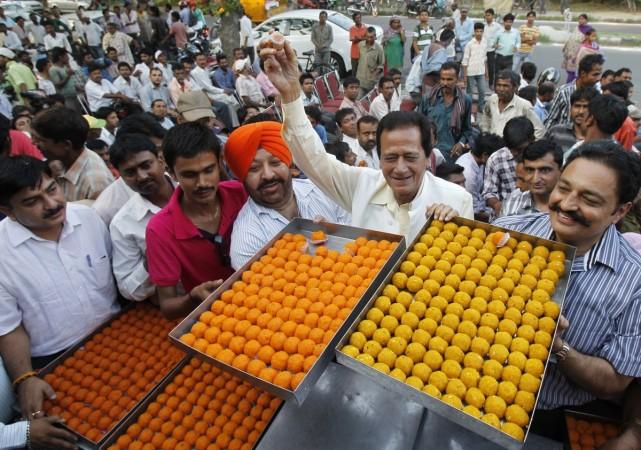
It's true that there is never a dull moment in Indian politics, but at the moment, things are apprently not so exciting for the Bhartiya Janata Party (BJP) as it braces for the crucial Assembly polls in Assam, Kerala, West Bengal, Tamil Nadu and Puducherry.
The party had won a landslide victory in the May 2014 general elections, a first in almost 30 years in Indian politics. Factors that gave the swept the party to power – the promise of creating jobs for the burgeoning youths, assurance to rein in galloping inflation and commitment to eradicate corruption – were compelling enough to ensure a resounding victory for the BJP.
Retail inflation, especially that of food items, was high during the UPA-II regime. "In the case of food inflation, the acceleration has been more pronounced, rising from 6.74% to 12.2% over the same period (2009-2014)," the Mint reported in May 2014, days before the results were announced.
Circa March 2016, and the first two are being seen as unfulfilled promises. While retail inflation was at a 17-month high in January 2016, there is not enough data to support number of jobs created ever since the BJP-led NDA came to power.
Of course, a report in the Economic Times in June 2015 did talk of a rise in jobs being created, but it is nowhere to the expectations of 10 million jobs being created every year.
It's true that no major scam has come to light since the coalition formed government in May 2014.
Prime Minister Narendra Modi, perceived by India Inc and many of his political rivals as pro-business, now faces a litmus test, given the changed context in which the elections will be fought. While the political slugfest between parties and the analysis by psephologists will continue to hog the limelight, the world, especially investors, would be watching the elections from a different viewpoint. For, at stake for Modi is the hope of increasing his party's current tally of 47 seats in the Upper House (Rajya Sabha), which holds the key to passing key economic legislations such as the Goods and Services Tax (GST) Bill.
The lack of numbers in the Upper House has been a hurdle for the BJP-led NDA in transacting business in the Parliament, notwithstanding the party's majority in the Lower House (Lok Sabha).
Assam, Kerala, West Bengal and Tamil Nadu send 50 members to the Rajya Sabha, and the BJP has none from these poll-bound states. Naturally, the party would be keen to put up a good performance so as to increase its numbers in the Rajya Sabha, where its principal rival, the Congress, has seats.
The task will be uphill for the BJP.
Apart from the two dominant regional parties – the All India Trinamool Congress, or AITC, in West Bengal and the All India Anna Dravida Munnetra Kazhagam, or AIADMK, in Tamil Nadu – the BJP will have to contend with a resurgent Congress, which was in the doldrums after its crushing defeat in the 2014 elections that reduced it to its lowest tally of 44 seats in the Lower House.
The X Factor
If the task was difficult, it has been made even more by the recent turn of events starting with the arrest of a student leader of Jawaharlal Nehru University (JNU) on charges of sedition and the consequent nationwide uproar.
Kanhaiya Kumar, the president of the JNU's students' union (JNUSU), was arrested for allegedly shouting anti-national slogans at an event organised on Feb. 9 at the JNU campus on the death anniversary of terrorist Afzal Guru, who was convicted for his role in the 2001 Parliament attack. His arrest resulted in a backlash by students, well supported by Modi's political rivals; his release three weeks later on Thursday was followed by a hero's welcome at JNU. Kumar then interacted with the media in New Delhi the next day wherein he took jibes at the Modi government, saying the Constitution can't be "doctored" and nationalism can't be "patented".
The Kanhaiya Kumar episode is bound to play a key role in damaging the BJP's poll prospects in West Bengal, where the Leftists are hoping to put up a good performance and have claimed that Kumar will support them, though the 29-year-old student leader apparently contradicted the party.
West Bengal sends 16 members to the Rajya Sabha.
In Tamil Nadu, which sends 18 members to the Rajya Sabha, the BJP does not have a presence to reckon with, especially in the context of the state's political landscape that is dominated by the two principal Dravidian parties – the AIADMK and its archrival, the Dravida Munnetra Kazhagam (DMK).
Of the other two states – Assam and Kerala – the BJP did put up a good performance in Assam winning seven of the 14 Lok Sabha seats in the 2014 general elections, but things could be difficult for the party in the changed scenario.
As for Kerala, the BJP would have to start from scratch.
If the party fails to perform well at the hustings and thereby its numbers in the Upper House, its reformist agenda will receive further setback, disappointing investors, a reality that could change the outlook of Asia's third-largest and the world's fastest-growing economy.
It could well result in foreign investors pulling out money from the debt and equity markets, derailing the government's disinvestment agenda and efforts to kick-start the investment cycle.
Narendra Modi and Amit Shah, the duo that matters the most in the BJP, have a task cut out.
[Disclaimer: This article reflects the writer's personal opinion and does not necessarily represent the views of IBTimes India.]








